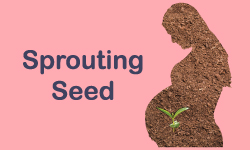Frequently asked questions
No, egg donation is not painful. The procedure is done under sedation, but some people experience slight discomfort afterwards.
Yes, egg donation is a safe process. However, as with any procedure, there are minor risks and some donors may feel some discomfort. We at Sprouting Seed try to ensure that our donors are comfortable and safe during the process.
After the egg retrieval has taken place, women are under observation for 2-4 hours. After that, no bed rest is required and donors can resume all daily activities.
Apart from being in a certain age bracket (23-32 years), oocyte donors at Sprouting Seed:
- Must be of a low to healthy body weight according to their height
- Following a healthy lifestyle (diet, exercise)
- In good physical and mental health
- Non-smokers and free from substance abuse
According to medical norms, a woman can donate eggs up to six times, with many months between each donation.
The time commitment for donating eggs typically involves several visits over 2-3 weeks for screenings, hormone treatment and egg retrieval, requiring minimal time off.
After egg donation, you may experience mild cramping, bloating or spotting. Most women recover quickly, resuming normal activities within a few days.
There are several factors that determine the success of donor egg IVF, including the age of the egg donor and the clinic’s protocols. Generally, success rates for donor egg IVF are higher than for traditional IVF. Success rates range from 40% to 60% per embryo transfer.
Traditional IVF involves using a woman’s own eggs, which are retrieved and fertilized with sperm in the lab. The resulting embryos are then transferred to her uterus.
Donor egg IVF, on the other hand, uses eggs from a donor. The eggs are fertilized with sperm (from a partner or a sperm donor) and the embryos are transferred to the recipient’s uterus. This approach is often used when the recipient has age-related fertility issues, poor egg quality, or other reproductive challenges.
Yes, using donor eggs allows a menopausal woman who has stopped producing eggs to get pregnant. If the woman’s uterus is healthy and receptive, she has a good chance of achieving a successful pregnancy.
The success rate for IVF with donor sperm or eggs ranges between 40% and 60%, depending on the recipient’s age, overall health, egg or sperm quality and treatment techniques.
The protocol for egg donor recipients includes screening, matching with a donor and preparing for IVF or insemination, followed by embryo transfer and monitoring for pregnancy.
To egg donor recipients, we say: We’re here to support your journey. Our carefully selected donors and expert care will help you achieve your dream of parenthood.
